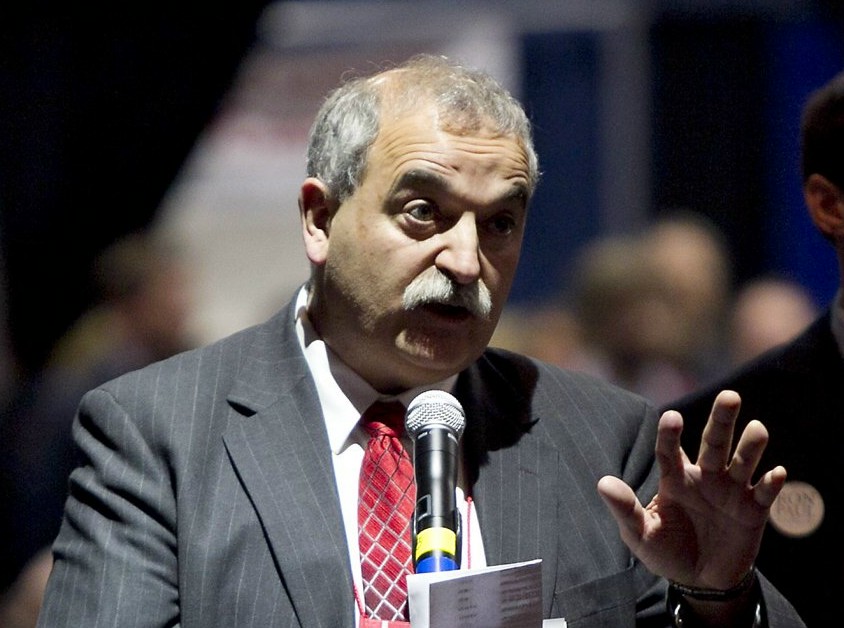PORTLAND — Two organizations are seeking a federal inquiry into the possible plans of outgoing Republican Party Chairman Charlie Webster to probe for voter fraud in some rural Maine towns, arguing that his tactics could harass and intimidate black voters.
The ACLU of Maine and the Brennan Center for Justice made their request to the U.S. Department of Justice on Friday in response to comments that Webster made about black voters in the week after Election Day.
Webster told a television reporter that he wanted to investigate reports that groups of unknown black people had voted in some rural towns on Nov. 6
He would not identify the areas, but said he planned to mail thank-you cards to newly registered voters in those areas and see if undeliverable mail would indicate improper registrations.
The American Civil Liberties Union of Maine and the Brennan Center, based at the New York University School of Law, contend that Webster’s plan violates the federal Voting Rights Act and the National Voter Registration Act.
In their letter, the organizations noted that Webster reiterated his concerns after the Maine Secretary of State’s Office said it had found no instances of voter fraud.
“As such, the only possible purpose for this planned ‘investigation’ is the public harassment and intimidation of Maine’s newly registered voters — who have attracted Mr. Webster’s attention by the sole virtue of their race,” the groups wrote to the Justice Department’s Voting Section.
On Friday, Webster said he has not decided whether to follow through with his postcard plan but he wouldn’t do it as party chairman.
Webster announced shortly after Election Day that he would not seek another term as head of the state party. His replacement will be chosen Saturday.
“It’s none of their business, what I might do or what I might not do,” he said of the two organizations. “Assuming I was intimidated by these people, this would be harassment by the ACLU of a private citizen.”
Webster faced harsh criticism, including from members of his own party, after his initial remarks. The controversy erupted while many Republicans were saying the party must attract more minority voters.
On Friday, Webster reiterated that his statements were not intended to be about race. He characterized the issue as one of unknown people in small towns where residents know one another.
“If you live in a small town and a 400-pound obese woman comes in that nobody knows in town — nobody’s ever seen her — people are going to say, ‘Who’s that?’ And then, if there’s five of them, or a Vietnamese family or a 97-year-old man nobody’s seen,” he said.
Zachary Heiden, legal director of the ACLU of Maine, said Webster’s postcard plan is a real concern, even if he is no longer head of his party.
“The best ultimate outcome is that Charlie Webster and everyone else in Maine learns that harassing or intimidating voters is against the law and it’s wrong — and they agree never to do it again,” he said.
The organizations characterized Webster’s postcard plan as “voter caging” and said that courts have found it illegal, particularly when it is racially motivated.
They said that incorrect addresses is an unreliable basis for challenging voter eligibility or purging voter rolls.
The organizations’ allegation about voter intimidation and harassment appears stronger than the one about caging, said Dmitry Bam, a University of Maine School of Law professor who teaches about voter rights.
He said voter caging applies to practices of government, rather than an individual with no authority over voter registration.
Bam said the postcard plan described by Webster isn’t a clear-cut case of voter intimidation but there’s a plausible argument that it is.
The issue would not be whether the postcard is threatening, he said, but whether the practice somehow interferes with a person’s right to vote, especially in connection with race.
“Courts generally frown upon linking someone’s race to suspiciousness,” Bam said.
A Justice Department spokeswoman failed to answer questions about whether the department had received the request, whether it had been acted on, and whether it is the type of matter the department would pursue.
The request is the ACLU’s second involving voting issues in little over a year.
In October 2011, the ACLU and the liberal think tank Demos asked the Justice Department to investigate Secretary of State Charles Summers for sending letters to more than 200 University of Maine students.
Summers’ letter told students to get Maine driver’s licenses, register their vehicles in Maine or relinquish their right to vote in the state.
Webster had provided Summers with a list of students who he said may have committed voter fraud.
The Justice Department apparently did not pursue that investigation.
Staff Writer Ann S. Kim can be contacted at 791-6383 or at:
akim@pressherald.com
Twitter: AnnKimPPH
Send questions/comments to the editors.



Success. Please wait for the page to reload. If the page does not reload within 5 seconds, please refresh the page.
Enter your email and password to access comments.
Hi, to comment on stories you must . This profile is in addition to your subscription and website login.
Already have a commenting profile? .
Invalid username/password.
Please check your email to confirm and complete your registration.
Only subscribers are eligible to post comments. Please subscribe or login first for digital access. Here’s why.
Use the form below to reset your password. When you've submitted your account email, we will send an email with a reset code.